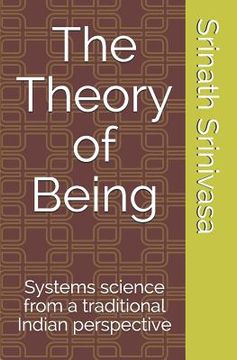Share
The Theory of Being: Systems science from a traditional Indian perspective (in English)
Srinath Srinivasa
(Author)
·
Independently Published
· Paperback
The Theory of Being: Systems science from a traditional Indian perspective (in English) - Srinivasa, Srinath
$ 6.00
$ 7.50
You save: $ 1.50
Choose the list to add your product or create one New List
✓ Product added successfully to the Wishlist.
Go to My WishlistsIt will be shipped from our warehouse between
Friday, June 14 and
Monday, June 17.
You will receive it anywhere in United States between 1 and 3 business days after shipment.
Synopsis "The Theory of Being: Systems science from a traditional Indian perspective (in English)"
This book is the author's attempt to interpret and explain Indic concepts based on dharma, using systems theory-- specifically game theory. The book also details the author's own journey in re-discovering these concepts, triggered by conceptual dissonance coming from two different ways of thinking or hermeneutics, while growing up. The "clockwork" model of Newtonian physics as well as more recent models of quantum mechanics, both treat the universe as an impersonal automaton, driven solely by the laws of physics and causality. In this book, this is called "machine hermeneutics"-- which is currently the "mainstream" way of interpreting the universe, taught in schools worldwide. While machine hermeneutics has been widely successful, it still has several conceptual gaps when we need to reason across energy and information. There is no simple way to connect the two. Dharmic concepts that is characteristic of the traditional Indian way of thinking, models the universe as an abstract entity called "being"-- where a "being" can itself be a system of smaller interacting beings. Rather than viewing systems as impersonal automata driven by causality, dharmic thought views systems as societies of autonomous stakeholders (its constituent beings). Each being itself is not just driven by causality, but also by an imperative to "be" or sustain itself as long as possible. Being-oriented modeling is promising at several fronts. It not only helps to build models that combine energy and information-- thus reasoning about intelligence and sentience, as well as about mechanics and dynamics in the same model. This book provides a philosophical overview of such possibilities, without getting into mathematical details. Being-oriented thinking, in the opinion of the author, also has important lessons for sustainability and policy-making.
- 0% (0)
- 0% (0)
- 0% (0)
- 0% (0)
- 0% (0)
All books in our catalog are Original.
The book is written in English.
The binding of this edition is Paperback.
✓ Producto agregado correctamente al carro, Ir a Pagar.

